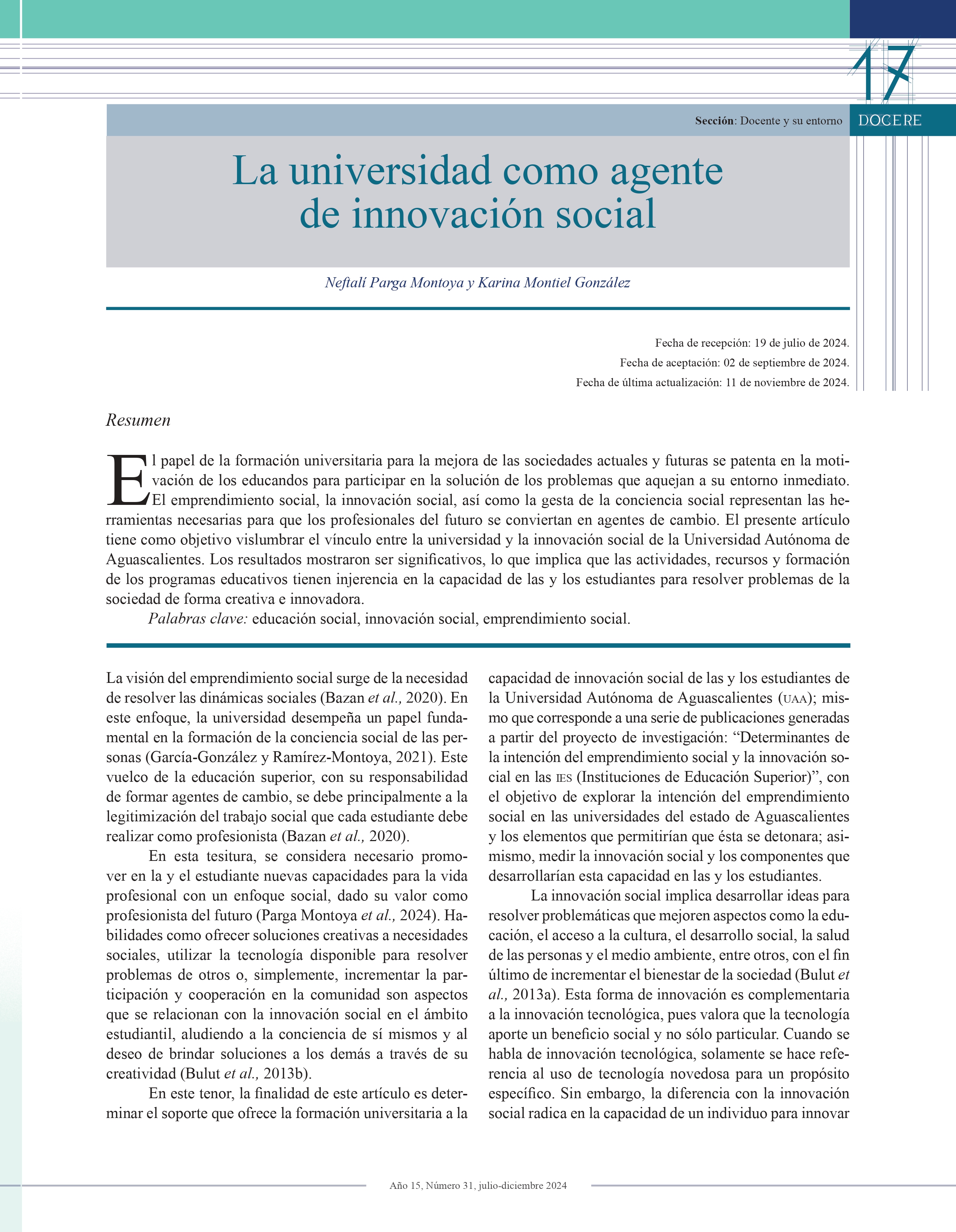University as a Social Innovation Agent
DOI:
https://doi.org/10.33064/2024docere317857Keywords:
social education, social innovation, social entrepreneurshipAbstract
The role of university formation for the improvement of the current and future societies is evident in the motivation of students to participate in the solution of problems that affect their immediate environment. Social entrepreneurship, social innovation, and the development of social awareness represent the essential tools that for professionals to become agents of change. The present article aims to explore to explore the link between the university and the social innovation of the Universidad Autónoma de Aguascalientes. The results were found to be significant, which implies that the activities, resources, and the development of educational programs influence the students’ ability to creatively and innovatively solve the problems of society.
Translated by: Adán Israel Vázquez Alba.
Downloads
Metrics
References
Adams, R., Grichnik, D., Pundziene, A. & Volkman, C. (2023). Artificiality and sustainability in entrepreneurship. En FGF Studies in Small Business and Entrepreneurship. https://doi.org/10.1007/978-3-031-11371-0_9. DOI: https://doi.org/10.1007/978-3-031-11371-0
Aramburuzabala, P. (2013). Aprendizaje-servicio: una herramienta para educar desde y para la justicia social. Revista Internacional de Educación para la Justicia Social, 2(2), 5-11.
Bayuo, B. B., Chaminade, C. & Göransson, B. (2020). Unpacking the role of universities in the emergence, development and impact of social innovations – A systematic review of the literature. Technological Forecasting and Social Change, 155(octubre 2019), 120030. https://doi.org/10.1016/j.techfore.2020.120030. DOI: https://doi.org/10.1016/j.techfore.2020.120030
Bazan, C., Gaultois, H., Shaikh, A., Gillespie, K., Frederick, S., Amjad, A., Yap, S., Finn, C., Rayner, J. & Belal, N. (2020). Effect of the university on the social entrepreneurial intention of students. New England Journal of Entrepreneurship, 23(1), 3-24. https://doi.org/10.1108/NEJE-05-2019-0026. DOI: https://doi.org/10.1108/NEJE-05-2019-0026
Belcher, B. M., Claus, R., Davel, R. & Jones, S. M. (2022). Evaluating and improving the contributions of university research to social innovation. Social Enterprise Journal, 18(1), 51-120. https://doi.org/10.1108/SEJ-10-2020-0099. DOI: https://doi.org/10.1108/SEJ-10-2020-0099
Bulut, C., Eren, H. & Halac, D. S. (2013a). Social innovation and psychometric analysis. Procedia-Social and Behavioral Sciences, 82, 122-130. https://doi.org/10.1016/j.sbspro.2013.06.235. DOI: https://doi.org/10.1016/j.sbspro.2013.06.235
Bulut, C., Eren, H. & Halac, D. S. (2013b). Which one triggers the other? Technological or social innovation. Creativity Research Journal, 25(4), 436-445. https://doi.org/10.1080/10400419.2013.843358. DOI: https://doi.org/10.1080/10400419.2013.843358
Cinar, R. & Benneworth, P. (2021). Why do universities have little systemic impact with social innovation? An institutional logics perspective. Growth and Change, 52(2), 751-769. https://doi.org/10.1111/grow.12367. DOI: https://doi.org/10.1111/grow.12367
García-González, A. & Ramírez-Montoya, M. S. (2021). Social entrepreneurship education: Changemaker training at the university. Higher Education, Skills and Work-Based Learning, 11(5), 1236-1251. https://doi.org/10.1108/HESWBL-01-2021-0009. DOI: https://doi.org/10.1108/HESWBL-01-2021-0009
Howald, J., Kaletka, C., Schroder, A., Rehfeld, D. & Terstriep, J. (2016). Social innovation: Driving force of social change, 612870, 32. https://www.si-drive.eu/?p=2283.%0Ahttps://www.si-drive.eu/?p=2283.%0AThis.
Parga Montoya, N., Montiel González, K. & Romo Bacco, C. E. (2024). La universidad y su papel en el emprendimiento social. Docere, 29, 26-31. https://doi.org/10.33064/2023docere295076. DOI: https://doi.org/10.33064/2023docere295076

Downloads
Published
How to Cite
Issue
Section
License
Esta obra está bajo una Licencia Creative Commons Atribución-NoComercial-CompartirIgual 4.0 Internacional.
El lector y/o usuario que utilice el material publicado en la revista DOCERE de la Universidad Autónoma de Aguascalientes, deberá en todos los casos: a) Reconocer la autoría del material utilizado, proporcionando un enlace a la licencia, además de indicar sí se han realizado cambios al material; b) Queda prohibido utilizar el material proveniente de la revista DOCERE, con finalidad comercial y, C) En los casos en los que se realice la remezcla, transformación o creación, a partir del material publicado de la revista DOCERE, se deberá dar reconocimiento de los derechos que correspondan a la Universidad Autónoma de Aguascalientes, en su carácter de titular de la materia protegible utilizada. En caso de infracción a lo antes dispuesto, el lector y/o usuario, se hará acreedor a las sanciones que establece la legislación de la materia.












